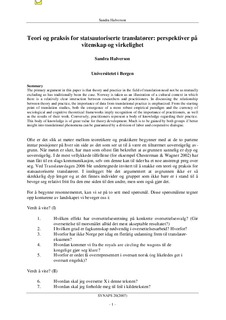| dc.contributor.author | Halverson, Sandra | |
| dc.date.accessioned | 2016-08-23T12:51:48Z | |
| dc.date.available | 2016-08-23T12:51:48Z | |
| dc.date.issued | 2007 | |
| dc.identifier.citation | SYNAPS - A Journal of Professional Communication 20(2007) pp.1-11 | nb_NO |
| dc.identifier.uri | http://hdl.handle.net/11250/2401122 | |
| dc.description | This article is in Norwegian. | nb_NO |
| dc.description.abstract | The primary argument in this paper is that theory and practice in the field of translation need not be as mutually
excluding as has traditionally been the case. Norway is taken as an illustration of a cultural context in which
there is a relatively clear interaction between researchers and practitioners. In discussing the relationship
between theory and practice, the importance of data from translational practice is emphasized. From the starting
point of translation studies, both the emergence of a more robust empirical paradigm and the currency of
sociological and cognitive theoretical frameworks imply recognition of the importance of practitioners, as well
as the results of their work. Conversely, practitioners represent a body of knowledge regarding their practice.
This body of knowledge is of great value for theory development. Much is to be gained by both groups if better
insight into translational phenomena can be guaranteed by a division of labor and cooperative dialogue. | nb_NO |
| dc.language.iso | nob | nb_NO |
| dc.publisher | NHH | nb_NO |
| dc.title | Teori og praksis for statsautoriserte translatører: perspektiver på vitenskap og virkelighet | nb_NO |
| dc.type | Journal article | nb_NO |
| dc.source.pagenumber | 1-11 | nb_NO |
| dc.source.volume | 20 | nb_NO |
| dc.source.journal | SYNAPS - A Journal of Professional Communication | nb_NO |
